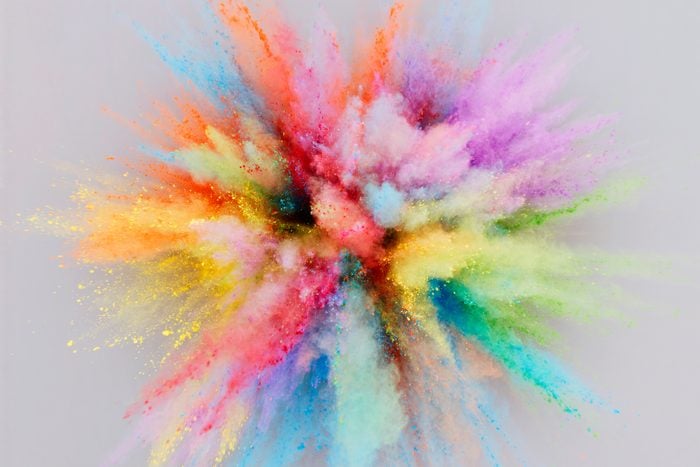What Masturbation Does to Your Brain
Updated: Jul. 13, 2023

That masturbation afterglow is all in your head—literally. Here's what happens in your brain when engaging in a little self-love.
You may have heard masturbation causes blindness, low sperm count, erectile dysfunction or is a relationship red flag: All myths experts wish we’d shut down for good. “People have perceptions that make them feel like [masturbation] is unhealthy, but it doesn’t do anything bad to your body,” explains Michele Waldron, Psy.D, LADC-I, CSCT, a licensed psychologist and Certified Couples and Sex Therapist. “Masturbation is a great way to learn about your body and be able to own your own pleasure.”
And not only are there no harmful physical effects of having some solo sexy time, experts say masturbation is a totally normal, healthy sexual behavior that triggers powerful changes in your brain. Through fMRI scans, researchers have been able to identify what areas of the brain respond when people are aroused, turned on, and experience orgasm, Dr. Waldron says—mapping masturbation’s feel-good effects.
This Is How Often Most People Masturbate, Say Doctors & Recent Data
Masturbation boosts your mood
When we masturbate, the brain floods the body with beneficial chemicals that collectively boost overall well-being, says Evie Plumb, accredited Sex Educator and Here We Flo’s registered Sexpert. Notably, we get a strong dose of dopamine, a chemical responsible for allowing us to feel pleasure, satisfaction, and happiness. Not having enough dopamine has been shown to contribute to low energy, low moods and a general lack of motivation, according to the Cleveland Clinic.
Why Do People Moan During Sex?
It’s an all-natural antidote to stress and anxiety
When we’re aroused, areas of our brain’s frontal cortex become less active, says Khristina Booth, DO, MS, a Family Physician at Union Health Center in New York City. “Think of this as the area that drives your decision-making,” she explains. With this logic-oriented region turned down, feelings of fear and anxiety decrease, encouraging relaxation.
Meanwhile, the hypothalamus releases oxytocin, a feel-good bonding hormone that promotes sexual arousal. Research shows that oxytocin actually acts as a protective buffer against cortisol—the stress hormone—by lowering cortisol levels and relieving stress.
Experts Say This Is the Surprising Age When Sexual Fantasizing Peaks
It’s one of nature’s best painkillers
The brain also releases endorphins during masturbation—and we get a huge hit of the hormones at orgasm. These endorphins “increase energy, blood flow and heart rate, decrease pain and stimulate our reward centers even more,” Dr. Booth says.
Endorphins play a critical role in pain relief, too. “Think of them as the body’s natural opioids,” Dr. Booth says. “Masturbation can relieve headaches and menstrual cramps and relax muscles,” for instance. In fact, 2020 research published in the International Journal of Molecular Science found that our body’s endorphins have a stronger pain-relieving effect than morphine.
7 Little-Known Erogenous Zones
Masturbation can help you get to sleep
“After orgasm, our brain signals our body to relax and enter the ‘rest and digest’ phase of the parasympathetic system,” Dr. Booth says. “We feel a sense of ease and can often sleep better.”
The release of serotonin—another happiness hormone—also has an effect. Serotonin helps regulate our sleep-wake cycle, and it’s an important building block to form melatonin, our body’s main sleep-inducing chemical. Research also shows that another hormone released during orgasm called prolactin promotes better rapid eye movement (REM) sleep, an important part of our sleep cycle for getting deeper, quality rest.
13 of Your Biggest Sleep Questions, Answered
It’s associated with self-confidence
While amped up on all these feel-good hormones, we’re in a safe space to understand what our body likes without the burden of self-consciousness, Dr. Waldron says. This self-exploration can strengthen our body image and confidence. One study from 2015 found that women who masturbate more frequently reported higher levels of self-esteem (as well as significantly more orgasms.)
It can trigger feelings like guilt and shame
Some people can feel what’s called “masturbatory guilt” because of the messages they’d received growing up, Dr. Waldron explains. “Many grow up in cultures of ‘slut shaming,’ which makes it hard for women especially to feel okay with enjoying the pleasure their bodies can give them.” Similarly, research shows men can experience anxiety over masturbation practices or frequency due to cultural, social, or familial influences.
“For these people, it can be helpful to unpack where all those messages are coming from,” Dr. Waldron says. “Ultimately, these psychological barriers are going to make it challenging for them to fully embrace their body and their pleasure.”
Prioritize self-care every day with The Healthy @Reader’s Digest newsletter and follow The Healthy on Facebook, Instagram, and Twitter. Keep reading:

